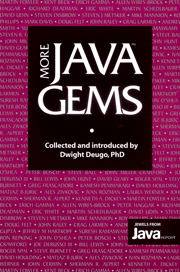Book contents
- Frontmatter
- Contents
- INTRODUCTION
- GETTING STARTED WITH JAVA
- MIGRATING TO JAVA
- TECHNIQUES 101
- MODELING AND PATTERNS
- JAVA IN A DISTRIBUTED WORLD
- THREADS
- USER INTERFACES
- CONSTRUCTING MODULAR USER INTERFACES IN JAVA
- JFC's SWING, PART 1: MODEL/VIEW/CONTROLLER
- PANEL STATES: A USER INTERFACE DESIGN PATTERN
- SECURITY
- TESTING
- PERFORMANCE
- REALITY CHECK
- INDEX
JFC's SWING, PART 1: MODEL/VIEW/CONTROLLER
Published online by Cambridge University Press: 06 July 2010
- Frontmatter
- Contents
- INTRODUCTION
- GETTING STARTED WITH JAVA
- MIGRATING TO JAVA
- TECHNIQUES 101
- MODELING AND PATTERNS
- JAVA IN A DISTRIBUTED WORLD
- THREADS
- USER INTERFACES
- CONSTRUCTING MODULAR USER INTERFACES IN JAVA
- JFC's SWING, PART 1: MODEL/VIEW/CONTROLLER
- PANEL STATES: A USER INTERFACE DESIGN PATTERN
- SECURITY
- TESTING
- PERFORMANCE
- REALITY CHECK
- INDEX
Summary
This the first first in a series of articles focusing on the Swing components that will be released as part of the Java Foundation Classes in JDK 1.2. I'll review the underlying infrastructure for the Swing components, in addition to some of the components Swing has to offer, in my next few installments. This month, after a brief history of the Java Foundation Classes, I'll discuss Swing's implementation of the Model/View/Controller (MVC) architecture.
THE JAVA FOUNDATION CLASSES
In addition to being a vast improvement over its predecessor, the 1.1 AWT lays the foundation for one of the most visible core Java APIs: Foundation Classes (JFC). The JFC consists of the 1.1 (and later) AWT, the Swing components, the 2D API, and the Accessibility API.
HISTORY OF THE JFC
Back in 1995, no one overestimated the impact that Java was about to have on the modern computing world. As a language originally designed for consumer electronic devices, Java was suddenly catapulted into the stratosphere as the language for developing Web software. Over the next couple of years, Java would mature quickly; not only the language but also core packages, such as the AWT.
The original AWT was not designed to be a high powered UI toolkit—instead it was envisioned as providing support for developing simple user interfaces for simple applets. The original AWT was fitted with an inheritance-based event model that did not scale well.
- Type
- Chapter
- Information
- More Java Gems , pp. 265 - 280Publisher: Cambridge University PressPrint publication year: 2000

